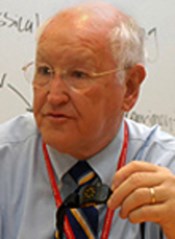Ask a college student if she's getting enough sleep, and the answer is likely to be "no." Even students who know they're sleep deprived don't realize just how severe their sleep deficit is -- or how it affects their lives.
But new research by psychology professor James Maas shows that educating students about the importance of sleep -- while also giving them objective feedback on their own sleep patterns -- can persuade them to significantly improve their habits. More sleep can lead to higher grades, better athletic performance and improved emotional and physical health.
For the research, which is the first large-scale study of sleep in college students to include both subjective and objective measures, Maas used the Zeo Personal Sleep Coach -- new technology that records a sleeper's time in light, deep and REM sleep through a small, wireless headband sensor.
Maas distributed 300 devices, loaned by Zeo Inc. of Newton, Mass., to volunteers in his Psychology 101 class at the beginning of the fall 2009 semester. The students kept a written sleep log and recorded six nights of sleep data at each of three time points during weeks two, six and 12 of the study.
Between the second and third time points, students heard Maas lecture on the importance of sleep and got personalized e-mail feedback based on their own sleep patterns.
Not surprisingly, said Maas, the students initially reported sleeping just an average of 7 hours 24 minutes a night -- much less than the 9 hours 15 minutes recommended for college students. But in comparing the students' sleep logs with the Zeo measurements, he also found that the students overestimated their sleep time by 47 minutes -- meaning they were actually getting an average of 2 hours 28 minutes less sleep than they should.
The study also showed that the combination of sleep education and direct feedback from the Zeo motivated students to sleep better. By the end of the semester, students had increased their total nightly sleep time by an average of 15 minutes; and more than three out of five students had started sleeping almost an hour longer.
The percentage difference was most dramatic for the students who began the study in the bottom quartile for total hours of sleep. Those students increased their total nightly sleep time by an average of 51 minutes, or 15 percent.
And students with the best sleep scores -- those who spent the longest total time asleep and the most time in deep sleep -- were also the ones with the highest grades in the class.
"Students in the past have said, 'I'm not going to change my sleep-wake schedule unless you can prove to me that it's going to make a significant difference in my grades,'" Maas said. "Now we have very good evidence that if you want to improve your general well-being, this is the key; and it's the key that some Cornellians use, and they're the ones who are getting the high grades."
Dale Pescatore '12 agreed. "I used to consider sleep a luxury, and it largely fell to the wayside when I was too busy balancing the other aspects of my life," Pescatore said. "Since using the Zeo, I have realized that when sleep becomes a priority, everything else will fall into place."
A parallel study was conducted by teaching assistant Rebecca Robbins among pre-medical students taking Maas' Psych 101 class at Weill Cornell Medical College in Doha, Qatar. Those results are currently being tabulated.





